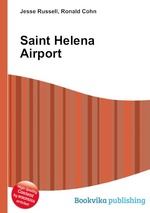Saint Helena Airport
Jesse Russell Ronald Cohn
бумажная книга
High Quality Content by WIKIPEDIA articles! Saint Helena Airport is an airport under construction since early 2012 through February 2016 in the British Overseas Territory of Saint Helena, a remote island in the South Atlantic Ocean located more than 2,000 kilometres (1,200 mi) from the nearest major landmass which can only be reached by ship today. The first considerations for an airport on St Helena were made in 1943 by the South African Air Force which undertook a survey on Prosperous Bay Plain from October 1943 until January 1944 but concluded that while technically feasible, an airport was not a practical proposition. From the 1960s, there was an idea to build an airport on the St Helena Island. In 1999, this was taken up by the island government. After a long period of rumour and consultation, the British government announced plans to construct an airport in Saint Helena in March 2005 and the airport was originally expected to be completed by 2010. However constant delays by the British government meant an approved bidder, the Italian firm Impregilo, was not chosen until 2008, and then the project was put on hold in November 2008, allegedly due to new financial pressures brought on by the credit-crunch. By January 2009, construction had not commenced and no final contracts had been signed, and the then Governor Andrew Gurr departed for London in an attempt to speed up the process and solve the problems. On 22 July 2010, the British government agreed to help pay for the new airstrip using taxpayer money. It was only on November 3, 2011 that the new Island Governor Mark Capes announced construction contracts were signed. The airport is expected to open in 2016, by which time the RMS Saint Helena, the only regular ship to call at St Helena, will be retired. Its advocates hope the airport will bring growth to the isolated island economy through the tourism sector which, in the long term, is expected to lead to financial self-sustainability and an end to UK budgetary aid.


